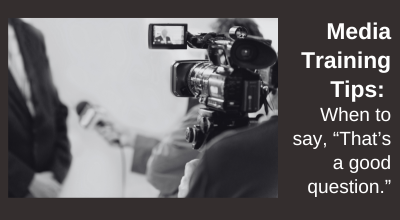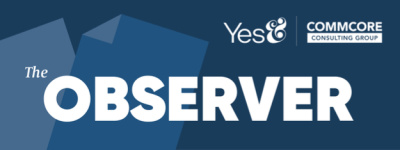 When you are at a press conference, panel discussion, or town hall, is there a best way to acknowledge a question?
When you are at a press conference, panel discussion, or town hall, is there a best way to acknowledge a question?
There is no absolute best way, however, there are a few general rules and one very strict rule on how not to start your answer.
First, while we believe that almost all answers belong to the broader audience, the questioner likes to be acknowledged. So, if possible get the questioner’s name and start your answer by talking to them, i.e. Marcia, thanks for the question. Or, Ralph, in answer to your question….
What about responding with: “That’s a great question.” In some circles, this is a naked time buyer, and it appears that the speaker or interview subject is ranking the question.
What about: “I’m glad you asked me that.” About half the time, you really are delighted to have the question. The other half, it’s code for “I can’t believe you asked me that stumper question.”
During COVID, we heard many experts during interviews using both of those acknowledgments. This was a situation when reporters were trying to ask smart questions to physicians and public health experts, and the experts were trying to be responsive. These responses were very acceptable to keep the interview going.
Do you need these tactics? Not really. Most of the time, it’s better just to answer and get straight into your points. However, responding first with an acknowledgment of the question is ok as well. Here are some examples of when filler phrases can be appropriate in an interview:
- We all need “think time” when answering a tricky or multi-part question.
- Sometimes you need time to think rather than sputtering out an unfiltered thought and continuing to ramble on.
- When a subject matter expert is asked a question, responding with “that’s a good question,” is one way to tell the interlocutor that they are thinking about the subject in the right way.
- Are their better ways to engage with a question? Sure. Sometimes you can say: That’s an important question. That’s a subject we think about too. That’s a question we get from our customers (or citizens).
- And here’s the absolute rule to avoid in responding: Never repeat the negative phrasing that some reporters and audience members employ. If you repeat the negative, that can be the quote or soundbite or what the audience takes away from the interaction.
It’s important to understand that although it’s ok to throw in a filler phrase every so often, an over-use of “that’s a great question” or “I’m glad you asked me that” could negatively impact your interview.
Media Training & Consulting
Yes& CommCore executives have handled every type of media crisis. They are here to help you respond to specific issues, and to prepare for your next press conference, media interview, panel discussion, town hall – or handling the press in general.
Reputation management in the digital age is our specialty; we will assign a team of consultants with experience in your industry to consult with you as you work to get ahead of the headlines
Interactive exercises, meaningful discussion, and real-life examples allow our trainees to take on even the toughest scenarios. We can train you one-on-one or put your whole team through our best-practice training.
Contact Us:
We can put you in touch with the right person to help with your specific media challenge.
To schedule a training or get answers quickly, call us at (202) 659-4177 or email info@yesandcommcore.com
We will provide urgently needed advice, and a proposal to help on an ongoing basis.


